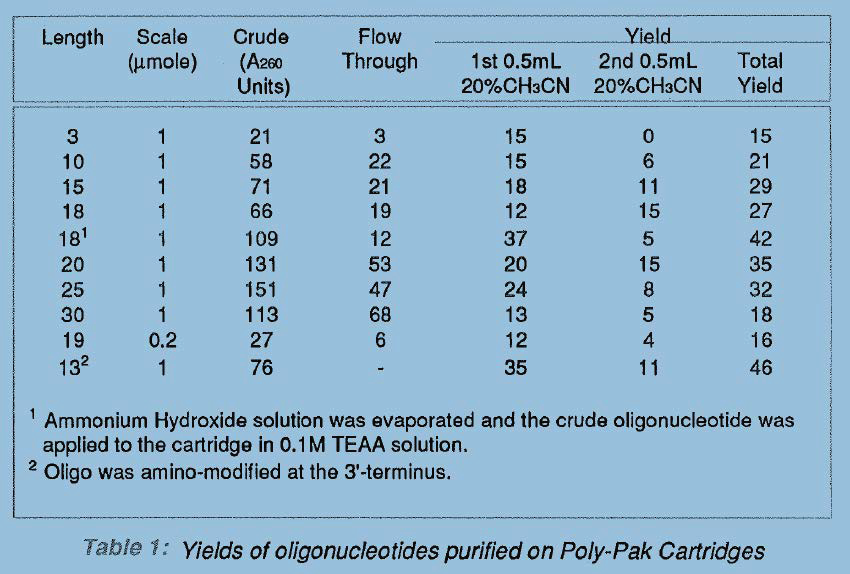Glen Report 4-23:Poly-Pak™ Cartridges - Recent Improvements
In recent months, many of our customers have noted a change in the appearance and performance of our Poly-Pak™ cartridges. By and large, these cartridges have gained acceptance as the basis of a fast, convenient procedure for purification of synthetic oligonucleotides. However, some features of the original cartridges were causing us concern and, for some time, we have been addressing means to improve performance. An improved product has now resulted.
While the original choice of packing material, PRP-1 from The Hamilton Company, is superb for chromatography of oligonucleotides in packed columns, the very fine particles gave problems in both manufacture and performance of Poly-Pak cartridges. The main drawback in performance was the significant back pressure, especially during the wash with 2M triethylamine acetate. We were also limited by back pressure in the load of packing material and so the yields from the original cartridges, although much higher than in some competing products, were still a disappointment to us.
Following an exhaustive study of potential replacement polymeric packing materials, we have adopted a new packing material which operates with a significantly lower back pressure than the PRP-1 which was previously used. The new version of Poly-Pak cartridges also leads to significantly higher yields of purified oligonucleotide, as demonstrated in Table 1.
Following a good quality synthesis of a 20mer on a 0.2 μmole scale, 10 - 12 A260 units of purified product are typically isolated. A similar sequence produced on a 1 μmole scale should yield 30 - 40 A260 units of product.
Glen Research has recently completed a new booklet, entitled "USER GUIDE TO POLY-PAK™ CARTRIDGE PURIFICATION". As well as covering the principles and procedures of purification of normal oligonucleotides, the guide covers the purification of oligophosphorothioates and amino-modified, thiol-modified and biotinylated oligonucleotides. A section also covers large-scale purification using bulk polymeric packing. The guide is well illustrated with representative chromatograms. It is delivered along with Poly-Pak orders but may be requested separately simply by calling Glen Research.

Notes: 1. Yields of crude and purified oligonucleotides vary with synthesis efficiency. The above results derive from routine syntheses and serve to illustrate yield variations which are unrelated to cartridge performance.
2. Flow through represents the portion of the crude oligonucleotide solution which is unretained by the cartridge. Further product can usually be isolated by applying this fraction to a new cartridge or the same cartridge once the first purification is complete.
3. The remainder of the A260 units of crude solution are usually eluted from the cartridge in the Ammonium Hydroxide/Water (1 :1 O) wash.
4. Elution of the purified product from the cartridge predominantly occurs in the first 0.5ml portion of 20% Acetonitrile wash. However, depending on the sequence, significant product may elute in the next 0.5ml wash.
Product Information
Poly-Pak™ Reverse Phase Purification Products have been discontinued

